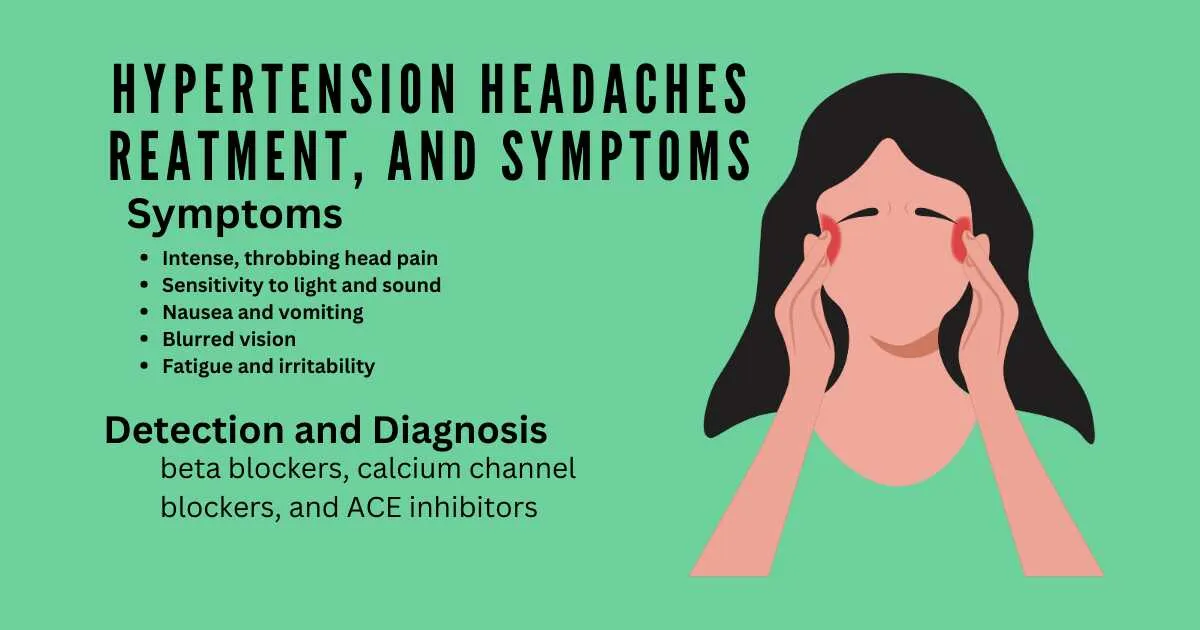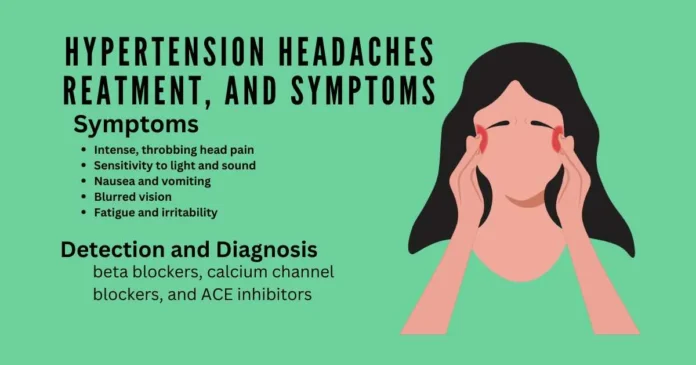Hypertension headaches, also known as high blood pressure headaches, are a common manifestation of elevated blood pressure levels. While headaches can have various causes, understanding the connection between hypertension and headaches is crucial for effective management and prevention.

Introduction to Hypertension Headaches
Hypertension, or high blood pressure, occurs when the force of blood against the artery walls is consistently too high. This condition can lead to various health complications, including cardiovascular diseases, kidney damage, and vision problems. One prevalent symptom of hypertension is headaches.
Understanding Hypertension and its Impact
Hypertension is often asymptomatic, earning it the moniker “silent killer.” However, when symptoms do occur, headaches are among the most common. These headaches typically present as a pulsating sensation, often accompanied by dizziness, nausea, and visual disturbances.
Identifying Symptoms of Hypertension Headaches
Symptoms of hypertension Headaches may vary from person to person, but commonly include:
- Intense, throbbing head pain
- Sensitivity to light and sound
- Nausea and vomiting
- Blurred vision
- Fatigue and irritability
Causes of hypertension headaches
Several factors contribute to high blood pressure, leading to hypertension headaches. These include:
- Genetics: Family history plays a significant role in predisposing individuals to hypertension.
- Poor diet and lifestyle choices: Consuming a diet high in sodium, saturated fats, and processed foods, along with sedentary habits, can increase the risk of developing hypertension.
- Stress: Chronic stress can elevate blood pressure levels over time, contributing to the onset of hypertension headaches.
- Lack of physical activity: leading a sedentary lifestyle without sufficient exercise can lead to weight gain and elevated blood pressure.
- Smoking: Tobacco use damages blood vessels and increases the risk of hypertension and associated headaches.
- Excessive alcohol consumption: Heavy drinking can raise blood pressure levels and contribute to the development of hypertension headaches.
Understanding these causes is essential for implementing preventive measures and effectively managing hypertension headaches.
Impact of Elevated Blood Pressure on Blood Vessels
Elevated blood pressure exerts excessive force on the walls of blood vessels, causing them to narrow and become less flexible. This constriction reduces blood flow to the brain, leading to oxygen deprivation and the onset of headaches. Additionally, prolonged hypertension can damage blood vessels, further exacerbating headache symptoms.
Importance of Early Detection and Diagnosis
Early detection and diagnosis of hypertension headaches are crucial for preventing severe complications. Regular blood pressure monitoring and prompt medical attention can help manage blood pressure levels effectively and reduce the risk of associated headaches.
- Medication: Healthcare professionals may prescribe medications such as beta blockers, calcium channel blockers, and ACE inhibitors to lower blood pressure and manage hypertension headaches.
- Lifestyle changes: Incorporating regular exercise, maintaining a balanced diet, and reducing stress are essential for managing hypertension and its associated symptoms.
- At-home remedies: While there is no cure for hypertension, adopting certain at-home treatments can help alleviate headache pain. Control of high blood pressure is the primary preventive measure.
- Cold or warm compress: Applying a cold or warm compress to the affected area may help reduce the pain and discomfort associated with hypertension headaches.
- Hydration: Drinking plenty of water can help maintain proper blood pressure levels and prevent headaches.
- Relaxation techniques: Practicing deep breathing, meditation, or progressive muscle relaxation can help lower blood pressure and alleviate headache symptoms.
- Over-the-counter pain relievers: Non-prescription pain medications such as ibuprofen or aspirin can provide temporary relief from hypertension headaches. However, it is crucial to consult with a healthcare professional before using these medications regularly.
Lifestyle Changes for Managing Hypertension Headaches
Adopting a healthy lifestyle is fundamental to managing hypertension headaches. This includes:
- Diet modifications: incorporating a balanced diet rich in fruits, vegetables, and whole grains while limiting sodium and processed foods.
- Regular exercise: Engaging in physical activity for at least 30 minutes most days of the week can help lower blood pressure and alleviate headaches.
- Stress management techniques: Practicing relaxation techniques such as deep breathing, meditation, and yoga can help reduce stress levels and prevent headaches.
Medications for Hypertension and Headache Relief
In addition to lifestyle changes, medications play a vital role in managing and alleviating associated headaches. These may include:
- Antihypertensive medications are prescribed to lower blood pressure levels and reduce the frequency and intensity of headaches.
- Pain relievers: Over-the-counter or prescription pain medications may be recommended to alleviate headache symptoms.
Alternative Therapies for Hypertension Headaches
Some individuals may benefit from alternative therapies to complement conventional treatments. These may include:
- Acupuncture is a traditional Chinese practice involving the insertion of thin needles into specific points on the body to alleviate pain and promote relaxation.
- Herbal remedies: Certain herbs, such as feverfew and butterbur, have been studied for their potential to reduce headache frequency and severity.
- Massage therapy: Gentle massage techniques applied to the head, neck, and shoulders can help relieve tension and reduce headache discomfort.
Seeking Professional Help: When to Consult a Doctor
It’s essential to seek medical attention if you experience frequent or severe headaches, especially if they are accompanied by high blood pressure readings. A healthcare professional can evaluate your symptoms, perform diagnostic tests, and develop a personalized treatment plan to address your condition effectively.
Preventive measures for hypertension headaches
Preventive measures play a crucial role in managing and reducing their impact on daily life. These may include:
- Regular blood pressure monitoring: keeping track of your blood pressure levels at home and reporting any significant changes to your healthcare provider.
- Compliance with medication regimen: taking prescribed medications as directed and attending regular follow-up appointments to monitor your progress.
- Avoiding triggers: identifying and avoiding triggers that may exacerbate headaches, such as certain foods, stress, or lack of sleep.
Coping strategies for individuals with hypertension
Living with hypertension can be challenging, but adopting effective coping strategies can improve quality of life. These may include:
- Stress management techniques: learning to manage stress through relaxation techniques, hobbies, and social support networks.
- Regular exercise: Engaging in physical activity not only helps lower blood pressure but also promotes overall well-being and reduces the frequency of headaches.
The Role of Nutrition in Managing Hypertension and Headaches
A healthy diet plays a crucial role in managing and preventing associated headaches. Emphasize foods rich in potassium, magnesium, and calcium while reducing your intake of saturated fats, cholesterol, and sodium.
Exercise and its Impact on Hypertension and Headaches
Regular physical activity is essential for maintaining cardiovascular health and reducing the risk of hypertension. Aim for a combination of aerobic exercise, strength training, and flexibility exercises to reap the maximum benefits.
Stress management techniques for hypertension patients
Chronic stress can contribute to elevated blood pressure levels and exacerbate headache symptoms. Explore stress management techniques such as mindfulness meditation, progressive muscle relaxation, and guided imagery to promote relaxation and alleviate headaches.
Importance of Sleep Hygiene in Hypertension Management
Quality sleep is vital for overall health and well-being, including blood pressure regulation. Practice good sleep hygiene by establishing a regular sleep schedule, creating a relaxing bedtime routine, and optimizing your sleep environment for restful sleep.
Conclusion
In conclusion, hypertension headaches are a common symptom of high blood pressure and can significantly impact an individual’s quality of life. By understanding the connection between hypertension and headaches and adopting healthy lifestyle habits, individuals can effectively manage their condition and reduce the frequency and severity of headaches.
FAQs (Frequently Asked Questions)
Are there any natural remedies for hypertension headaches?
Some individuals find relief from hypertension headaches through alternative therapies such as acupuncture, herbal remedies, and massage therapy. However, it’s essential to consult with a healthcare professional before trying any new treatment.
What should I do if I experience frequent headaches and high blood pressure?
If you experience frequent headaches accompanied by high blood pressure readings, it’s crucial to consult with a healthcare provider for proper evaluation and treatment. They can help identify the underlying cause of your symptoms and develop an appropriate management plan.
Can stress exacerbate hypertension headaches?
Yes, stress can contribute to elevated blood pressure levels and exacerbate headache symptoms. Practicing stress management techniques such as meditation, deep breathing exercises, and relaxation techniques can help alleviate symptoms.
Is medication necessary for managing hypertension headaches?
In addition to lifestyle changes, medications may be prescribed to manage hypertension and alleviate associated headaches. It’s essential to work closely with a healthcare provider to determine the most appropriate treatment plan for your individual needs.




